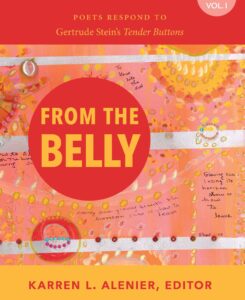
Vol 1, Karren L. Alenier, Editor
9781944585617
The Word Works (2023)
140 pages, $28.00, Paper
Reviewed by Susan Azar Porterfield
As Karren Alenier tells us in her “Introduction,” what she found most intriguing after reading Gertrude Stein’s The Autobiography of Alice B. Toklas was Stein’s invitation, her permission perhaps, to just go ahead and play: poetry-play, language-play, reality-play. In response to the invite, Alenier wrote the poem “Leo on Seasaw,” which she offers up, she says, for the pleasure of Gertrude Stein. And not only is the piece playful in form/language, it’s also about the actual, physical act of playing:
Little Buddha
Kleiner Bruder
bitty bother
in the butter
little brooder
tiny brother
sitting baldly
in the batter
But there’s play and then there’s a more complicated kind of play. There’s jouissance, the word that feminist critic Hélène Cixous appropriates to be able to talk about the creative power and joy of women. Is what’s going on here, in this anthology From the Belly, just pure fun and games? Stein’s Tender Buttons (1914) is probably, as Alenier notes, “a love poem and the marriage contract between Gertrude Stein and her life-long partner Alice Babette Toklas.” Given the times, the two often spoke in code about their relationship. The title words, tender buttons, for example, probably refers to the clitoris and/or breast nipples. Today, we might recognize that coded or “other” way of writing as écriture féminine, a term that can be seen as describing writing that refuses to play, if the game is the same old, tired one. It’s writing that seeks to follow its own rules, because the old game is rigged. Thus, for example, in the writing game that Stein devises, she avoids nouns, since a noun, by its nature, defines a thing. Instead of naming an object, she tries to indicate it–not the cup or table but her cup or table, something she has experienced, something personal. Something, significantly, that’s not universal. In Stein’s time and probably in ours as well, universality, as we’re often told, is the gold standard for poetry, the game you must play to be taken seriously.
Good thing Stein didn’t. Part of the fun of Tender Buttons is that it doesn’t want to be the “last word” on anything, to be the great author speaking in the great author voice. The work encourages reader-response participation, acknowledges it, celebrates it. Therefore, we’re granted this collection of response-poems that can almost be seen as annotating Stein’s object poems:
So, for example, here’s Stein’s “A Leave.”
In the middle of a tiny spot and nearly bare there is a nice thing to say that wrist is
leading. Wrist is leading.
And here is “after ‘A Leave,” Rae Armantrout’s response to Stein’s “A Leave.”
I.
It is difficult to find
the middle. it is
nil
willing a wisp.
II.
A flame wallows in wax gladly.
Put your finger on it,
it’s gone.
Then it jumps up again.
Well, the world is—let’s just say it—a serious, serious place, and Stein’s poetry is—let’s concede it—not all that easy to understand, given its rule-busting vibe. It’s good, then, here in From the Belly, Alenier’s collection of poems that riff off of Stein’s, to have literature that encourages us to dance a little dance. To sing along.
Published in Cider Press Review, Volume 25, Issue 1.
See all items about Susan Azar Porterfield
Visit Susan Azar Porterfield’s contributors page.
See all items about Karren LaLonde Alenier
Visit Karren LaLonde Alenier’s contributors page.


 Susan Azar Porterfield’s three books of poetry include In the Garden of Our Spines, Kibbe (Mayapple Press) and Dirt, Root, Silk, which won the Cider Press Review Editor’s Prize. Individual poems have appeared in The Georgia Review, Barrow Street, EcoTheo, Mid-American Review, North American Review, Crab Orchard Review, Nimrod, Rhino, Puerto del Sol, Poetry Ireland Review, Slipstream, Room, Ambit, Magma. Porterfield is a Poetry Editor at Cider Press Review.
Susan Azar Porterfield’s three books of poetry include In the Garden of Our Spines, Kibbe (Mayapple Press) and Dirt, Root, Silk, which won the Cider Press Review Editor’s Prize. Individual poems have appeared in The Georgia Review, Barrow Street, EcoTheo, Mid-American Review, North American Review, Crab Orchard Review, Nimrod, Rhino, Puerto del Sol, Poetry Ireland Review, Slipstream, Room, Ambit, Magma. Porterfield is a Poetry Editor at Cider Press Review. Karren LaLonde Alenier is author of eight poetry collections—including Looking for Divine Transportation (The Bunny and the Crocodile Press, 1999), winner, 2002 Towson University Prize for Literature; and in 2021 how we hold on (Broadstone Books). Her opera Gertrude Stein Invents a Jump Early On with William Banfield premiered in New York City in 2005 with a favorable review by The New York Times. She actively promotes contemporary literature through The Word Works. Visit
Karren LaLonde Alenier is author of eight poetry collections—including Looking for Divine Transportation (The Bunny and the Crocodile Press, 1999), winner, 2002 Towson University Prize for Literature; and in 2021 how we hold on (Broadstone Books). Her opera Gertrude Stein Invents a Jump Early On with William Banfield premiered in New York City in 2005 with a favorable review by The New York Times. She actively promotes contemporary literature through The Word Works. Visit 


